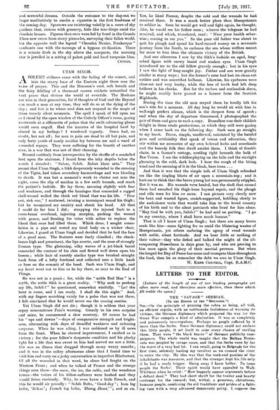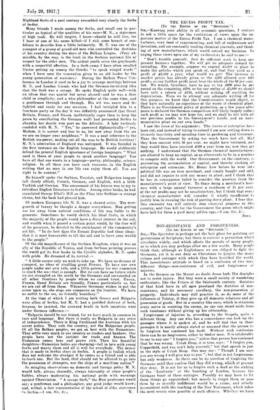LETTERS TO THE EDITOR-
[Letters of the length of one of our leading paragraphs are often mere read, and therefore more. effective, thaa these which fill treble the space.]
THE "SAVAGE" SERBIAN.
(To ME Evros or TUE "firrormos."3 Sta.—On the principle of praising the cobra as being, all told, 1 an efficient reptile, with no rattlesnake foolishness of warning its I victims, the German diplomacy which. prepared. the way for the- ' Great War compels a kind of admiration. It was- so completely and poisonously unscrupulous. Perhaps no people suffered by it more than the Serbs. Since German diplomacy could' not enslave this little people, it set itself to seise- every chance of reviling them. They were "the black beasts" of German publicity cam- ; paigners. The whole world was taught that the Balkan Penin- sula was peopled by savage races, and that the Serbs were by far the worst of a very bad- lot. I can recall, going to Belgrade-for the, first time, solemnly loading my revolver as we crossed the river to enter the city. My idea was that the, week-end pastime el the inhabitants was massacre, and that the stranger kept his life only if be had a ready trigger. Going away I knew better. No tamp people the Serbs! Their spirit would have appealed to Walt . Whitman when he cried: "How beggarly appear arguments before- a defiant deed." They-had- short shrift for the traitor and hearty contempt for the coward; but, withal, a generous, chivalrous, humane people; combining the old traditions and prides-of a fight- ing race with a very advanced' democratic polity, 1 suppose the) Highland Scots of a past centers. resembled very closely the Serbs of to-day.
Many -friends I made among the Serbs, and recall one in par- ticeder as typical or-the qualities of his race—lif. N., a statesman of high rank. He will forgive, I know—should he still live, for
hear of one of his name killed—if I risk some breach of con- fidence to describe him a little intimately. M. N. was one of the youngest of-a group of grand-old men who controlled the destinies of his conntry-during the days of -the Balkan League. (Very ad- mirable, by the way, is the trait in the Serbian national life of respect for the older men. The ardent youth serve the greybeards with a respectful affection. In a Serb camp I have often recalled Nestor getting up among the Greeks "to srpeak winged words" when I have seen the veneration given to an old leader -by the young generation of warriors.) During the Balkan Peace Con-
ference in London it used to be a joy-to arrange meetings between • N. and London friends who had the German-inculcated idea
that -the -Serb was a savage. He spoke English quite well—with an idiom that was quaint but never absurd—and Ile was a dear child in simplicity, and a wise philosopher at the same time, and a gentleman through and through. His wit was suave and de- lightful and ready for any occasion. I had inveigled him to a luncheon party on the day it was definitely announced that Great Britain, France, and Russia (pathetically eager then to keep the peace by conciliating the German wolf) had persuaded Serbia to abandon her -dearly won port on the Adriatic. A lady tactlessly condoled with M. N. "Yes," he answered diplomatically—" yes, Madam, it is sorrow and loss to us, for now away from the sea we are no longer your neighbour." It was a neat reference to the British era-power, making out all the seas to be British territory! AL N.'s admiration of England was unfeigned. It was founded in the 'first instance on the English language. He would stubbornly defend the general English ignorance of foreign languages. "What need is -there- of your people to speak another language? Yon have all that one wants in a language—poetry, philosophy, science, religion. In all these you have such treasures in the English writing that no man in one life can enjoy them all. You are right to be content."
He himself spoke the Serbian, Russian, and Bulgarian tongues (all closely allied), French, German, and English, with a little Turkish and Grecian. The amusement of his leisure was to try to introduce English literature to Serbia. Among other books, ha had translated George Eliot's BM on She Floss into Serbian—a strange choice, but the book had pleased him.
Of modern European life M. N. was a shrewd critic. The over- growth of luxury he thought a danger everywhere. Man getting too far away from natural conditions of life teas liable to de- generate. Sometimes he would sketch his ideal State, in which the majority of the people would have a direct interest in the soil, and wealth when it passed a certain point would, by the free will of its possessor, be devoted to the enrichment of the community's art life. "In its best days the Roman Republic had these ideas: that it is most honourable to till the soil and to leave your wealth to the people."
Of the old magnificence of the Serbian Kingdom, when it was an ally of the Republic of Venice, and from Serbian printing presses the world got its first books in the Cyrillic alphabet, M. N. spoke with pride. He dreamed of its revival:—
" A little-corner only we wish to take up. We have no dreams of conquest, no ideas Of rivalling great Powers. To have our own people under our own rule, and a little gateway for our commerce to reach the sea—that is enough. But we can have no future while tee are strangled on the north by the Germans and eurrounded on all other frontiers by people whom we cannot trust. Russia, France, Great Britain are friendly, France particularly SO, but we are cut off from them. Whenever Germany wishes to-put the acrew upon us, Bile stops our commerce on the frontier. We have no outlet to the see, no friendly boundary."
At the time of which I am writing both Greece and Bulgaria were allies of Serbia, but H. N. -had a justified distrust of both, because, he insisted, the crowned heads in both countries were under German influence
"Bulgaria should be our friend, for we have much in common in- race and language. But there is really no Bulgaria in any sense of independence. There is King Ferdinand the Austrian with his secret police. They rule the country, not the Bulgarian people. Of all the Balkan peoples, we get on -best with the Rumanians. They settle very much in our country as traders and bankers. Our people have not the instinct for trade and finance. The Rumanian comes here and grows rich. Then his beautiful daughters—Rumanian ladies are charming—fall in love with young Serbs and marry them and all is well for everybody. The money that is made in Serbia stays in Serbia. A people is foolish which does not welcome the stranger if he comes as a friend and is able to leech one. But the land, that should not be allowed to go into -the possession -of strangers, nor the ships of a maritime nation."
So mingling observations on domestic and foreign policy M. N. would talk, always shrewdly, always tolerantly of other people's 'foibles, always moderating his national pride with warnings against Chauvinism. "A savage Serb," the Hun professors would say; a -gentleman and a philosopher, any good judge would know; and, withal, a fair representative of the school of elder statesmen



































 Previous page
Previous page